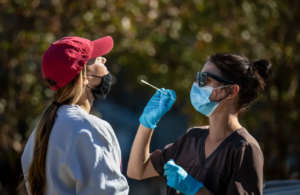With questions about omicron’s severity still unanswered, Texas braces for new COVID-19 wave this winter

As the omicron variant of COVID-19 quickly spreads across the United States, public health experts fear that Texas’ health care system could once again be overwhelmed by the disease within weeks.
“It’s really accelerating fast,” said Dr. Peter Hotez, a virologist at Baylor College of Medicine. “I think we’re going to be in the middle of it by Christmas.”
The new variant of the coronavirus was detected in Texas for the first time earlier this month, and outbreaks and surging case counts have since been tied to the strain. Although COVID-19 hospitalizations remain relatively low in most of the state, a fast-rising number of people are testing positive for the virus in the state’s urban centers. Hospitals in the Texas Panhandle and El Paso are again filling up with COVID-19 patients, according to data from the Texas Department of State Health Services.
As of Thursday, there have been 116 confirmed coronavirus cases related to the omicron variant in Texas, the state health department said. Although the delta variant is still prominent in Texas, medical researchers predict omicron will soon become the dominant strain. Early evidence suggests omicron may be milder but spreads faster and more often to vaccinated people, medical experts said. They expect that people who have been fully vaccinated and recently gotten a booster shot will still be much better protected from serious illness or death.
Still, medical researchers are trying to determine how severe omicron-related infections are on unvaccinated individuals or even the less-recently vaccinated, since evidence of more mild infections is based largely on anecdotal cases among a younger population, like in South Africa. With Texas’ lagging vaccination rates and an already-depleted hospital workforce, public health experts in the state fear omicron could become devastating for the health care system — even if the variant ends up largely causing only relatively mild illness.
“Those rural counties where we have low vaccination rates and have lost hospital infrastructure, those I think we should be the most concerned about,” said Rebecca Fischer, an infectious disease epidemiologist at the Texas A&M University School of Public Health. “The past 20 months we have seen hospitals close, we’ve seen hospitals lose their staff. … We are not in a great place with our health care infrastructure to handle another mass influx of cases.”
As of Friday, about 20% of people hospitalized in the El Paso and Panhandle hospital regions had COVID-19, according to state health data, putting them above the 15% marker previously used to indicate whether local officials could enact some restrictions. New infections in Dallas County are more than three times higher than they were two weeks ago. And the state’s positivity rate — which calculates the percentage of COVID-19 tests that come back positive — has inched to nearly 10%, putting the state in the so-called “red zone,” in which federal officials urge more restrictions to limit the virus’ spread.
Although it’s often unclear whether omicron or delta is behind current infections, local news reports have highlighted ever-climbing numbers of cases in areas throughout the state, with some notable ones tied to the new variant.
This week, the University of Texas at Austin reported a spike in coronavirus cases that is believed to be driven by the omicron variant. Nearly 80 cases were confirmed among students in two days this week, compared with less than 30 cases the entire previous week, according to the Austin American-Statesman. The increase came days after three UT-Austin cases were deemed likely to be related to the new strain and contracted through community spread.
The Houston Chronicle reported Thursday that the new variant made up about 32% of COVID-19 hospitalizations in a city hospital system testing strain types, up from 13% on Dec. 11. Omicron traces are also being detected at more of the city’s wastewater treatment plants.
The uptick in COVID-19 infections related to the omicron variant is part of a new wave of cases in the Houston area, with the Texas Medical Center reporting more than triple the number of positive cases last week, the Chronicle reported. The Harris County Public Health system this week reported its highest single-day total of positive cases in more than two months, and the mayor said he tested positive for the virus Friday.
What the new variant means for vaccinated individuals is still unclear, but UT-Austin projections released Thursday predict that the new variant could, in a worst-case scenario, lead to the most severe health care surges of the pandemic throughout the nation. More optimistically, the variant could lead to a less drastic spike in deaths and hospitalizations than what the country saw in January. The projections presume that omicron will be as severe as delta for unvaccinated individuals with no antibodies, and that vaccinated individuals will have significant but potentially less protection than they have against delta.
When delta raged in Texas this fall, the state health department reported that unvaccinated people were 13 times more likely to become infected with COVID-19 than fully vaccinated people, and were 20 times more likely to die.
Fischer does not expect that disparity to wane with omicron, and she and Hotez urged more Texans to get vaccinated as quickly as possible. About 56% of the state’s population is fully vaccinated, according to the health department, and more than 10 million Texans have not had any dose of the vaccine. About two million Texans are under 5 and therefore ineligible for vaccination.
Experts and local and state public health officials urged those who are already vaccinated to get a booster before traveling during the holidays if possible. Hotez, who is co-director of the Texas Children’s Hospital Center for Vaccine Development, said a new study indicated older doses of the Pfizer vaccine may provide less protection against infection of omicron than with the delta variant.
“It gets much better after the third dose, but even then [protection] begins to wane pretty quickly … especially against symptomatic illness,” he said. “It’s still holding up well against severe disease.”
During what is expected to be a high surge, even fully vaccinated individuals should try to eat outdoors when visiting restaurants, gather in small groups, and simply be mindful of hygiene and the protection of those around them, the experts and officials said.
“Our ultimate expectation, and in a way our hope given that we are not expecting the virus to magically disappear, is that we settle to a place where it does cause more mild diseases and that vaccines will prevent disease and death just as the flu shot does,” Fischer said.
But with depleted health care resources and a high percentage of unvaccinated individuals, she’s unsure if that hope will become reality anytime soon.
This article was originally posted on With questions about omicron’s severity still unanswered, Texas braces for new COVID-19 wave this winter







